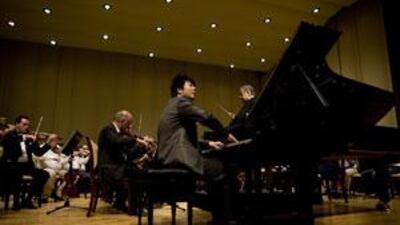His name might mean "very brilliant", but the Chinese pianist Lang Lang was not going to survive at Emirates Palace on his reputation and presumptuous moniker alone. Backed by the Vienna Philharmonic orchestra and the Mumbai-born conductor Zubin Mehta for a vigorous rendition of Chopin's Piano Concerto No2 in F Minor, the 26-year-old gave a virtuoso performance, as well as an accomplished display of showmanship.
Compared to playing the opening of the Beijing Olympics, Saturday's show was probably not a daunting affair for Lang - but there certainly wasn't any compromise, either. From delicate trickles to mad flurries of notes, it is easy to see why he is considered one of today's greatest players. The alleged lack of sensitivity which has led some critics to dub him "Bang Bang", was not noticeable. In fact, he rarely overpowered the orchestra who gave a mighty performance of the piece. In the concerto's midsection, his playful piano melded effortlessly with the wistful strings to give the work a powerfully engaging dynamism.
The black-clad performer, whose chubby, grinning face adorns the bedroom walls of a million Chinese teenagers, is very easy to watch. He begins to sway gently before even striking his first note and carries on moving from side to side throughout the performance. When the piece came to its triumphant climax, he leapt up and victoriously cast his arms to his sides, as the orchestra powered home the concerto's final notes.
Unsurprisingly, the performance received a standing ovation, which Lang gleefully accepted, returning to his piano for a short solo recital of Liebestraum (Dream of Love) by Liszt. Silence engulfed the audience as he played the brittle-sounding lament. It lasted less than 10 minutes, but for many in the audience, this will be the enduring memory of the evening. Earlier in the show, Mehta and the Vienna Philharmonic opened by treating the crowd to a stirring and dramatic performance of Wagner's overture from the opera Rienzi. The conductor skillfully guided the players through the piece's soothing melodic opening into its dramatic, forceful latter half.
After the interval and Lang Lang's departure from the stage, a number of empty seats become visible in the crowd. It is no surprise that the pianist, the face of ascendant China and all of its cultural ambition, was the night's biggest draw, but the second half was certainly not without its highlights. Zubin Mehta is a true maestro of the old school who trained in Vienna in the late 1950s. As he took the Vienna Philharmonic through Strauss's Ein Heldenleben (A Hero's Life), he proved why he has conducted almost every orchestra of note in the western world.
The epic work, which was completed in 1898, heralds the composer's more mature period and tells the story of the hero in a number of movements. With movements titled The Hero's Adversaries and The Hero's Companion, each component part of this work has its own personality and utilises the orchestra differently. Worthy of particular praise is Rainer Küchl, the Vienna Philharmonic's lead violinist, whose powerful yet poignant solos were one of the night's highlights. His argumentative riffing with the double basses underscored the theme of conflict within the piece.
If there is to be any criticism of Mehta and the Vienna Philharmonic it is that there were few surprises. Despite this small handicap, Mehta and the orchestra's overall performance was one of great finesse, something which was most noticeable in the Chopin concerto, with Lang Lang. Although the pianist is incapable of stepping on a stage without grabbing almost all of the attention, the orchestra and its conductor did a fine job of retaining some of the limelight for themselves.

Lang Lang lights up the Emirates Palace
His name might mean "very brilliant", but the Chinese pianist Lang Lang was not going to survive at Emirates Palace on his reputation and presumptuous moniker alone.
Most popular today
